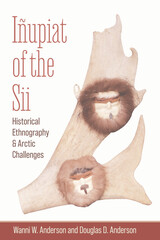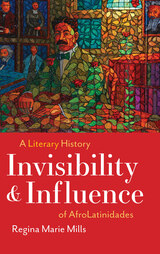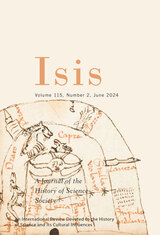5 books about Other Studies
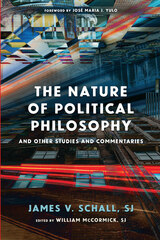
The Nature of Political Philosophy
And Other Studies and Commentaries
James V. Schall
Catholic University of America Press, 2022
In his final collection of essays, Father Schall explores the life of faith across a dazzling array of subjects, from Martin Luther to bioethics. With his characteristic patience, brilliance, and careful tenacity, Father Schall interrogates profoundly what it means to try to be a citizen of the Kingdom of God in the city of Man. Never shying away from controversy, across 14 articles and 4 book reviews Father Schall investigates the critical themes of his life and scholarship: reason and revelation; the nature of modernity; literature and salvation; metaphysics and politics; and much more.
Whether the reader is new to Father Schall or a longtime student, this posthumously-published collection of essays offers a profound meditation on the nature of political philosophy, and particularly what it would mean for Catholicism to offer a political philosophy. From such fundamental considerations, Schall explores ethical, literary and legal themes, displaying his typical breadth and depth of engagement with all that is real.
Ultimately, Father Schall leads one on a Socratic enterprise, an education whereby one comes to question for oneself basic assumptions, and to dig deeper into the first principles as they are recalled in the orders of knowledge and being. While Father Schall has passed on to his reward, this collection of essays helps ensure that his lessons continue to guide, challenge and enrich students for generations to come.
[more]

The Open-Air Churches of Sixteenth-Century Mexico
Atrios, Posas, Open Chapels, and Other Studies
John McAndrew
Harvard University Press

Scientific Papers of Arthur Holly Compton
X-Ray and Other Studies
Arthur Holly Compton
University of Chicago Press, 1974
Arthur Holly Compton was one of the great leaders in physics of the twentieth century. In this volume, Robert S. Shankland, who was once a student of Compton's, has collected and edited the most important of Professor Compton's papers on X-rays—the field of his greatest achievement—and on other related topics. Compton entered the field of X-ray research in 1913 and carried on active work until the 1930s, when he began to specialize in cosmic rays.
During the years when Compton was an active leader in X-ray research, he made many notable contributions which are reflected in the papers presented here. He was the first to prove several important optical properties of X-rays, including scattering, complete polarization, and total reflection. He was also the first, with his student R. L. Doan, to use ruled gratings for the production of X-ray spectra.
Professor Compton's greatest discovery, for which he was awarded a Nobel Prize in 1927, was the Compton Effect. This was the outgrowth of experiments he had initiated during a year at Cambridge in 1919-20. He did the major portion of these experiments at Washington University in St. Louis during the period 1920-24. His work demonstrated that in the scattering of X-rays by electrons, the radiation behaves like corpuscles, and that the interaction between the X-ray corpuscles and the electrons in the scatter is completely described by the principles of the conservation of energy and momentum for the collisions of particles.
In his introduction, Professor Shankland gives a historical account of the papers, narrates Professor Compton's early scientific career, and shows how he arrived at a quantum explanation of the Compton scattering after eliminating all classical explanations.
During the years when Compton was an active leader in X-ray research, he made many notable contributions which are reflected in the papers presented here. He was the first to prove several important optical properties of X-rays, including scattering, complete polarization, and total reflection. He was also the first, with his student R. L. Doan, to use ruled gratings for the production of X-ray spectra.
Professor Compton's greatest discovery, for which he was awarded a Nobel Prize in 1927, was the Compton Effect. This was the outgrowth of experiments he had initiated during a year at Cambridge in 1919-20. He did the major portion of these experiments at Washington University in St. Louis during the period 1920-24. His work demonstrated that in the scattering of X-rays by electrons, the radiation behaves like corpuscles, and that the interaction between the X-ray corpuscles and the electrons in the scatter is completely described by the principles of the conservation of energy and momentum for the collisions of particles.
In his introduction, Professor Shankland gives a historical account of the papers, narrates Professor Compton's early scientific career, and shows how he arrived at a quantum explanation of the Compton scattering after eliminating all classical explanations.
[more]
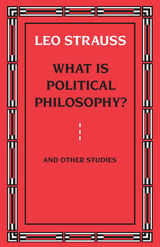
What is Political Philosophy? And Other Studies
Leo Strauss
University of Chicago Press, 1988
"All political action has . . . in itself a directedness towards knowledge of the good: of the good life, or of the good society. For the good society is the complete political good. If this directedness becomes explicit, if men make it their explicit goal to acquire knowledge of the good life and of the good society, political philosophy emerges. . . . The theme of political philosophy is mankind's great objectives, freedom and government or empire—objectives which are capable of lifting all men beyond their poor selves. Political philosophy is that branch of philosophy which is closest to political life, to non-philosophic life, to human life."—From "What Is Political Philosophy?"
What Is Political Philosophy?—a collection of ten essays and lectures and sixteen book reviews written between 1943 and 1957—contains some of Leo Strauss's most famous writings and some of his most explicit statements of the themes that made him famous. The title essay records Strauss's sole extended articulation of the meaning of political philosophy itself. Other essays discuss the relation of political philosophy to history, give an account of the political philosophy of the non-Christian Middle Ages and of classic European modernity, and present his theory of esoteric writing.
What Is Political Philosophy?—a collection of ten essays and lectures and sixteen book reviews written between 1943 and 1957—contains some of Leo Strauss's most famous writings and some of his most explicit statements of the themes that made him famous. The title essay records Strauss's sole extended articulation of the meaning of political philosophy itself. Other essays discuss the relation of political philosophy to history, give an account of the political philosophy of the non-Christian Middle Ages and of classic European modernity, and present his theory of esoteric writing.
[more]
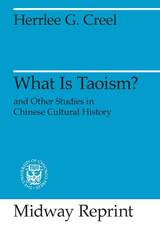
What Is Taoism?
and Other Studies in Chinese Cultural History
Herrlee Glessner Creel
University of Chicago Press, 1982
What Is Taoism? traces, in nontechnical language, the history of the development of this often baffling doctrine. Creel shows that there has not been one "Taoism," but at least three, in some respects incompatible and often antagonistic. In eight closely related papers, Creel explicates the widely used concepts he originally introduced of "contemplative Taoism," "purposive Taoism," and "Hsien Taoism." He also discusses Shen Pu-hai, a political philosopher of the fourth century B.C.; the curious interplay between Confucianism, Taoism, and "Legalism" in the second century B.C.; and the role of the horse in Chinese history.
[more]
READERS
Browse our collection.
PUBLISHERS
See BiblioVault's publisher services.
STUDENT SERVICES
Files for college accessibility offices.
UChicago Accessibility Resources
home | accessibility | search | about | contact us
BiblioVault ® 2001 - 2024
The University of Chicago Press


